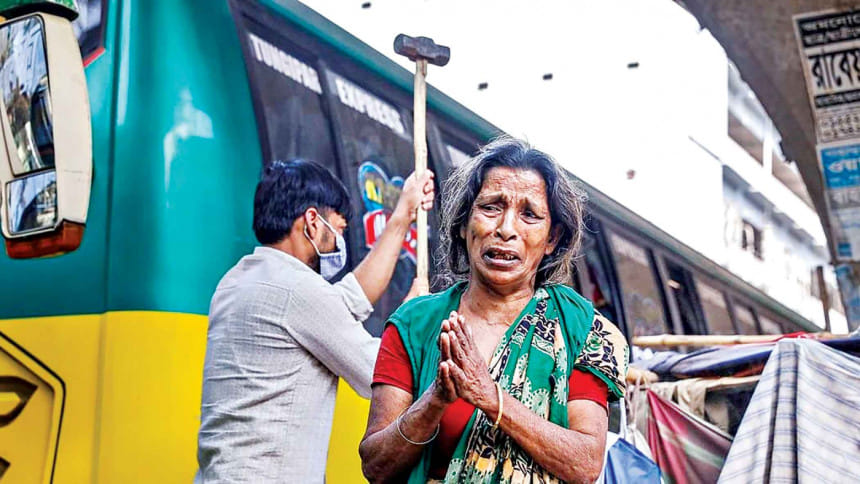Feminism must be inclusive for it to be effective

On March 2, the Prothom Alo shared a post that would move even the hardest of hearts—a photo of Dhaka South City Corporation cleaner Nurjahan Begum, pressing her hands together with tears in her eyes, begging the executive magistrate not to demolish her temporary homestead in Fulbaria, Dhaka. Behind her, it is clear that her pleas will be ignored—a hammer is already raised, poised to knock down her flimsy shelter to make way for the Mayor Hanif Flyover.
This picture leads to the obvious question—why is a cleaner employed by the government living in such dire need, made homeless by a government project? In 2018, when I investigated the wage structure of city corporation cleaners for a report, I found that "tendered labourers" hired out by private contractors were being paid as little as Tk 5,000 per month, while working every day of the week for daily wages. I remember interviewing a woman who broke down when speaking of her two sisters, both of them City Corporation cleaners who died in road accidents while on the job. At the time, she was working around 14 hours a day in part-time jobs, struggling to raise her children and two of her nieces.
When it comes to writing about women's issues, I usually find myself in a dilemma. On one hand, I can immediately think of 27 different things that affect my life as a woman in a patriarchal society that makes me want to scream into a pillow on an almost daily basis. On the other, I'm acutely aware that I speak from a position of privilege—an educated, working professional with feminist family members, writing in English for an English-reading audience—and nothing I experience as a woman comes even close to what Nurjahan Begum and other working class women are going through.
Perhaps that is why there exists the complaint from certain quarters about feminism not being representative enough, and they aren't always wrong; although more often than not, their criticism is an attempt to dismiss feminism altogether rather than make it more inclusive. However, as we stand on the brink of turning into a developing country, with greater development opening up possibilities of greater equality, now is the time for us, the women who are in positions to have their voices heard, to look inwards and remind ourselves that there are over 80 million women from hugely different backgrounds and contexts who live in Bangladesh today, and a majority of them are fighting battles on a front that we will never experience in the same way.
When reflecting on my positionality in this, I've realised that my struggles have often dealt with social and cultural barriers—not being able to wear what I want in public spaces, being restricted to certain gendered roles within family hierarchies, being judged for engaging in behaviours that do not align with traditional, patriarchal views of women etc. While in no way belittling these experiences (they are mine, after all!), from this perspective, it is far too easy to align oneself with what some academics have referred to as "neoliberal feminism"—a line of thought that overemphasises individual liberties and puts the onus on women for "empowering" themselves, without actively recognising socioeconomic and cultural structures of power that shape women's lives and entrench gender inequality beyond an individual woman's ability to simply "break free" with a little bit of confidence and entrepreneurial spirit.
In The Rise of Neoliberal Feminism, Catherine Rottenberg writes: "Incessantly inciting women to accept full responsibility for their own well-being and self-care, neoliberal feminism ultimately directs its address to the middle- and upper-middle classes, effectively erasing the vast majority of women from view. And, since it is informed by a market calculus, it is uninterested in social justice or mass mobilisation."
We have heard these arguments too, whether it is from development experts peddling microcredit for women as the miracle cure for poverty in Bangladesh—with little thought towards the unpaid care work or uninsured business risks (and zero labour rights) these women have to take on meanwhile—or from garments factory owners who highlight the improved economic positions of garments workers while ignoring their inability to organise properly and demand better working conditions, health insurance, job security etc.
But when a well-known Bangladeshi businesswoman reportedly dismisses worries over the spread of Covid-19 in RMG factories by making off-hand comments about how poorer people have better immune systems, all the while acting like the factories are doing the poor a favour by providing employment—while at the same time, surveys from that period show that missing out on even a month's wages can push workers into poverty and force them to reduce crucial spending on healthcare and nutrition—we have to acknowledge that there is a problem.
When female migrant workers continue to return to Bangladesh with horrific stories of violence (if they are even alive to tell their tales); when domestic workers still cannot take days off, get healthcare provisions or become part of the formal labour force regardless of repeated attempts to enact a law that protects them; and when tea workers, many of them indigenous women, have to negotiate for months on end for the sake of a living wage of Tk 300/day and only end up with a Tk 18 rise that gives them a meagre Tk 120/day—we have to admit to ourselves that the neoliberal dream of the empowered working woman, living a life of dignity and equality, can oftentimes be a complete fallacy if it ignores the power structures that work against women from disadvantaged/minority backgrounds.
And as our growing GDP rates correspond with growing female labour force participation, it is becoming clearer that the battle for women's rights will ultimately be closely tied to the battle for workers' rights in Bangladesh. Obviously, this doesn't mean that workers' rights are solely about women, only that any analysis of gender inequality is incomplete without also looking at the other inequalities that can add to and exacerbate it. In a world where social justice can often take the backseat to economic development, inequalities of class are bound to have a strong impact on the rights of women.
The recent mass movement against rape can be an interesting example here. It is safe to say that the fear of sexual violence hangs over the head of almost every Bangladeshi woman, and it is this solidarity that sparked such widespread protests last year. However, one of the most gruesome of those cases was the gang-rape of a woman from a household so impoverished that the knowledge of her abuse only reached the justice system when a video of it went viral. Although the hard work of Bangladeshi feminists has led to the enactment of laws that protect women, structural inequalities can still prevent them from accessing these laws. It is also pertinent that around the same time, an indigenous woman was gang-raped in Khagrachhari, but her story has all but disappeared, demonstrating how inequalities of race and religion can also make certain women invisible.
In 1986, feminist scholar Chandra Mohanty famously criticised Western scholarship for reducing women from the "Third World" into a single, collective "other". In later works, she extended this criticism to other actors who can also be blind to these structural power relations, writing, "the assumption [is] that categories of race and class have to be invisible for gender to be visible".
As we move forward with the women's movement, we have to ensure that we urban, middle class feminists are also not guilty of lumping Bangladeshi women into a single, collective other. I personally believe self-interrogation is the best place to start. It isn't easy to claim our individuality in a society that constantly wants us to keep our mouths shut and "know our place". But while on the important path to claiming our individual liberties, we cannot leave behind the women for whom the bigger picture of social justice and human rights is perhaps more urgent.
Shuprova Tasneem is a member of the editorial team at The Daily Star.
Her Twitter handle is @shuprovatasneem.

 For all latest news, follow The Daily Star's Google News channel.
For all latest news, follow The Daily Star's Google News channel. 



Comments